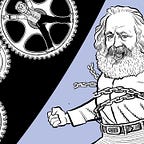Our Instincts Are Who We Are: Finding Our Way in the Mess of Civilization
5 min readMar 10, 2022
Recently I reread Fernando Pessoa’s “The Book of Disquiet.” (If you haven’t read it, I highly recommend it.) In a later chapter, the narrator said something that struck me. To paraphrase, he stated that every emotion we have has an instinctual basis. This seems obvious on its surface. For example, if I feel angry, it could be that my body is telling me that I’m…
